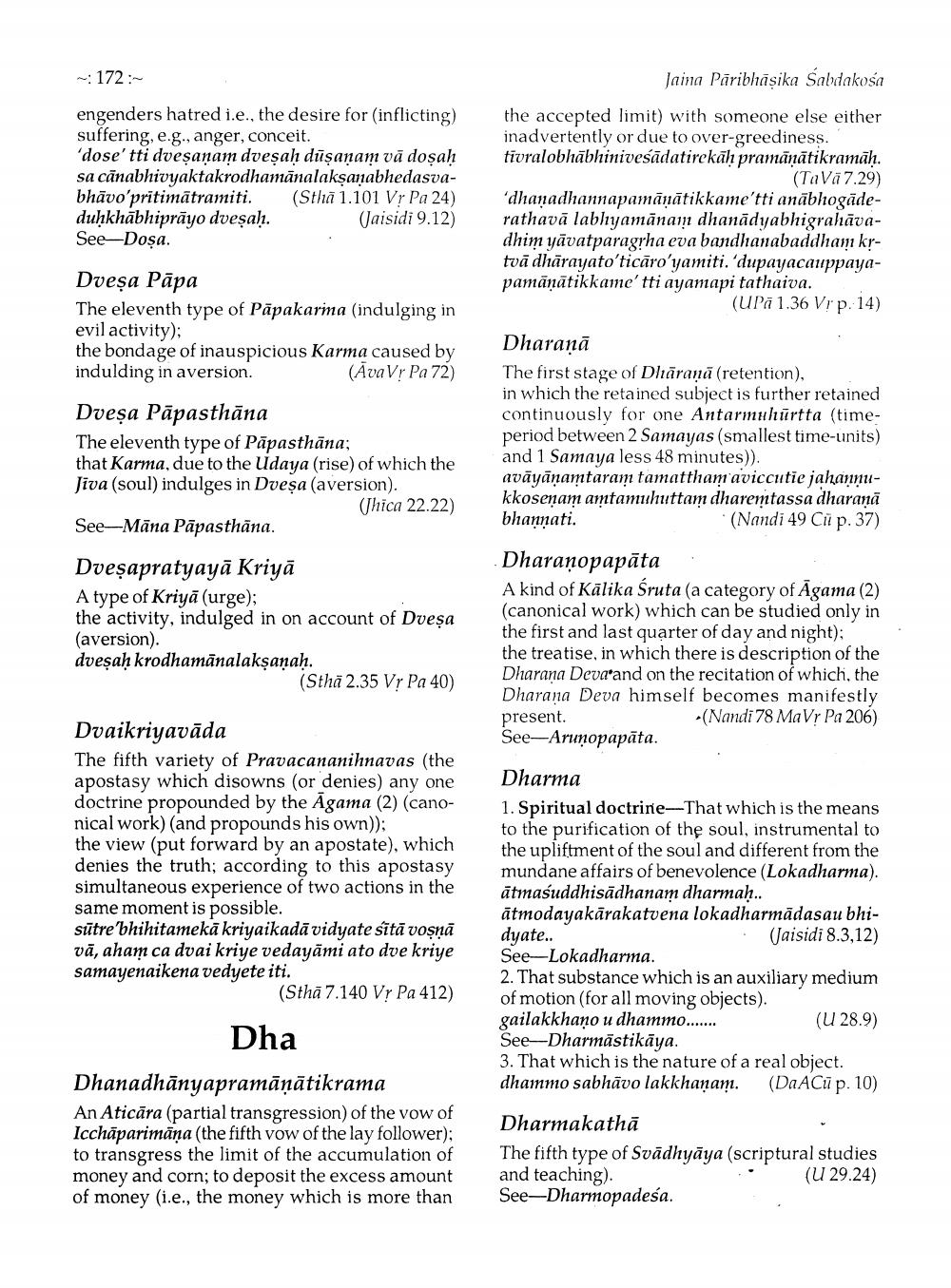________________
- 172:
Jaina Pāribhāsika Sabdakosa
engenders hatred i.e., the desire for (inflicting) suffering, e.g., anger, conceit. 'dose' tti dveşanam dveşah dūṣaṇam vă dosah sa cānabhivyaktakrodhamānalakşanabhedasvabhāvo'pritimātramiti. (Sthā 1.101 Vr Pa 24) duḥkhābhiprāyo dveşah.
(Jaisidi 9.12) See-Doşa.
the accepted limit) with someone else either inadvertently or due to over-greediness. tivralobhābhinivesādatirekāh pramāņātikramāh.
(TaVā7.29) 'dhanadhannapamāṇātikkame'tti anābhogāderathavā lablıyamānam dhanādyabhigrahāvadhim yāvatparagrha eva bandhanabaddhamkrtvā dhärayato'ticāro'yamiti. 'dupayacauppayapamāṇātikkame'tti ayamapi tathaiva.
(UPă 1.36 VI p. 14)
Dveşa Pāpa The eleventh type of Pāpakarma (indulging in evil activity); the bondage of inauspicious Karma caused by indulding in aversion.
(AvaV? Pa 72)
Dveşa Pāpasthāna The eleventh type of Pāpasthāna; that Karma, due to the Udaya (rise) of which the Jiva (soul) indulges in Dveşa (aversion).
(Thica 22.22) See-Māna Pāpasthāna.
Dharanā The first stage of Dhāraņā (retention), in which the retained subject is further retained continuously for one Antarmuhurtta (timeperiod between 2 Samayas (smallest time-units) and 1 Samaya less 48 minutes)). avāyānamtaram tamatthamaviccutie jahannukkosenam amtamuhuttam dharemtassa dharanā bhannati.
(Nandi 49 Cū p. 37)
Dveşapratyayā Kriyā A type of Kriyā (urge); the activity, indulged in on account of Dvesa (aversion) dveşaḥ krodhamānalakṣaṇaḥ.
(Sthā 2.35 Vr Pa 40)
Dharaṇopapāta A kind of Kālika Śruta (a category of Āgama (2) (canonical work) which can be studied only in the first and last quarter of day and night); the treatise, in which there is description of the Dharana Deva and on the recitation of which, the Dharana Deva himself becomes manifestly present.
-(Nandi 78 Ma Vr Pa 206) See-Aruņopapāta.
Dvaikriyavāda The fifth variety of Pravacananihnavas (the apostasy which disowns (or denies) any one doctrine propounded by the Agama (2) (canonical work) (and propounds his own)); the view (put forward by an apostate), which denies the truth; according to this apostasy simultaneous experience of two actions in the same moment is possible. sütre'bhihitamekā kriyaikadā vidyate sītā voşņā vā, aham ca dvai kriye vedayāmi ato dve kriye samayenaikena vedyete iti.
(Sthā 7.140 V; Pa 412)
Dharma 1. Spiritual doctrine-That which is the means to the purification of the soul, instrumental to the upliftment of the soul and different from the mundane affairs of benevolence (Lokadharma). ātmasuddhisādhanam dharmaḥ.. ātmodayakārakatvena lokadharmādasau bhidyate..
. (Jaisidi 8.3,12) See-Lokadharma. 2. That substance which is an auxiliary medium of motion (for all moving objects). gailakkhaņo u dhammo....
(U 28.9) See-Dharmāstikāya. 3. That which is the nature of a real object. dhammo sabhāvo lakkhanam. (Da ACūp. 10)
Dha
Dhanadhānyapramāṇātikrama An Aticāra (partial transgression) of the vow of Icchāparimāņa (the fifth vow of the lay follower); to transgress the limit of the accumulation of money and corn; to deposit the excess amount of money (i.e., the money which is more than
Dharmakathā The fifth type of Svādhyāya (scriptural studies and teaching).
(U 29.24) See-Dharmopadeśa.




